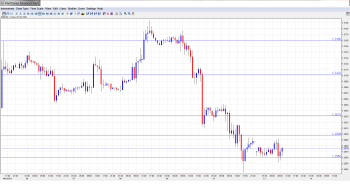EUR/USD dropped close to one-month lows, as the pair fell below the 1.30 level on Friday. The dollar took advantage of solid US employment numbers, which has raised speculation that the US Federal Reserve could wind up its QE program earlier than expected. US releases wrapped up a very quiet week on a positive note, as the federal budget surplus was higher than expected. On Monday, the sole release from the Eurozone is a meeting of EU finance ministers in Brussels. In the US, the markets will get a look at two major releases – Retail Sales and Core Retail Sales.
Here is a quick update on the technical situation, indicators, and market sentiment that moves euro/dollar.
EUR/USD Technical
Asian session: Euro/dollar was steady, touching a low of 1.2959 and consolidating at 1.2974. The pair is unchanged in the European session.
Current range: 1.3030 to 1.31.
Further levels in both directions:
<img alt=”EUR USD Daily Forecast May 10png” src=”https://www.forexcrunch.com/wp-content/uploads/2013/05/EUR-USD-Daily-Forecast-May-10png-350×196.png” width=”350″ height=”196″ />
<img alt=”EUR USD Daily Forecast May 9png” src=”https://www.forexcrunch.com/wp-content/uploads/2013/05/EUR-USD-Daily-Forecast-May-9png-350×196.png” width=”350″ height=”196″ /> <span class=”mceItemHidden”>&<span class=”mceItemHiddenSpellWord”>lt</span>;<span class=”mceItemHiddenSpellWord”>img</span> alt=”EUR USD Daily Forecast May 8png” <span class=”mceItemHiddenSpellWord”>src</span>=”https://www.forexcrunch.com/<span class=”mceItemHiddenSpellWord”>wp</span>-content/uploads/2013/05/EUR-USD-Daily-Forecast-May-8png-350×196.<span class=”mceItemHiddenSpellWord”>png</span>” width=”350″ height=”196″ /></span> <span class=”mceItemHidden”>&<span class=”mceItemHiddenSpellWord”>lt</span>;<span class=”mceItemHiddenSpellWord”>img</span> alt=”EUR USD Daily Forecast May 7″ <span class=”mceItemHiddenSpellWord”>src</span>=”https://www.forexcrunch.com/<span class=”mceItemHiddenSpellWord”>wp</span>-content/uploads/2013/05/EUR-USD-Daily-Forecast-May-7-350×196.<span class=”mceItemHiddenSpellWord”>png</span>” width=”350″ height=”196″ /></span> <span class=”mceItemHidden”>&<span class=”mceItemHiddenSpellWord”>lt</span>;<span class=”mceItemHiddenSpellWord”>img</span> alt=”EUR USD Daily Forecast May6″ <span class=”mceItemHiddenSpellWord”>src</span>=”https://www.forexcrunch.com/<span class=”mceItemHiddenSpellWord”>wp</span>-content/uploads/2013/05/EUR-USD-Daily-Forecast-May6-350×196.<span class=”mceItemHiddenSpellWord”>png</span>” width=”350″ height=”196″ /></span> <span class=”mceItemHidden”>&<span class=”mceItemHiddenSpellWord”>lt</span>;<span class=”mceItemHiddenSpellWord”>img</span> alt=”EUR USD Daily Forecast May3″ <span class=”mceItemHiddenSpellWord”>src</span>=”https://www.forexcrunch.com/<span class=”mceItemHiddenSpellWord”>wp</span>-content/uploads/2013/05/EUR-USD-Daily-Forecast-May3-350×196.<span class=”mceItemHiddenSpellWord”>png</span>” width=”350″ height=”196″ /></span> <span class=”mceItemHidden”>&<span class=”mceItemHiddenSpellWord”>lt</span>;<span class=”mceItemHiddenSpellWord”>img</span> alt=”EUR_USD Daily May2″ <span class=”mceItemHiddenSpellWord”>src</span>=”https://www.forexcrunch.com/<span class=”mceItemHiddenSpellWord”>wp</span>-content/uploads/2013/05/EUR_USD-Daily-May2-350×196.<span class=”mceItemHiddenSpellWord”>png</span>” width=”350″ height=”196″ /></span> <span class=”mceItemHidden”>&<span class=”mceItemHiddenSpellWord”>lt</span>;<span class=”mceItemHiddenSpellWord”>img</span> alt=”EUR_USD Daily May1″ <span class=”mceItemHiddenSpellWord”>src</span>=”https://www.forexcrunch.com/<span class=”mceItemHiddenSpellWord”>wp</span>-content/uploads/2013/05/EUR_USD-Daily-May1-350×196.<span class=”mceItemHiddenSpellWord”>png</span>” width=”350″ height=”196″ /></span>
Below: 1.2960, 1.2880, 1.2805, 1.2750 and 1.27.
Above: 1.3000, 1.3030, 1.31, 1.3160, 1.32, 1.3255, 1.3290, 1.3350 and 1.34.
The pair is testing support at 1.2960. 1.2880 is stronger. On the upside, 1.3000 is providing resistance.
Euro drops under 1.30 after strong US employment numbers – click on the graph to enlarge.
EUR/USD Fundamentals
All Day: Eurogroup Meetings. 12:30 US Core Retail Sales. Exp. -0.1%. 12:30 US Retail Sales. Exp. -0.3%. 14:00 US Business Inventories. Exp. 0.3%.
For more events and lines, see the Euro to dollar forecast
EUR/USD Sentiment
ECB mulls negative deposit rates: The euro’s volatility continued late last week, and the currency has lost close to two cents against the dollar since Thursday. The US dollar got a boost thanks to strong US employment numbers and a positive reading from the US Federal Budget. As well, remarks by ECB member Ignazio Visco that the ECB is considering negative deposit rates is weighing on the euro, as this would lead to the flow of funds out of the Eurozone. The ECB would be the first major central bank to adopt negative deposit rates. Proponents of the idea argue that it would increase lending to businesses and help boost economic activity in the sluggish Eurozone.US employment picture brightens: There was only one major event last week, US Unemployment Claims. The key indicator looked sharp, pointing to 323 thousand new claims. This easily beat the estimate of 333 thousand. It was the third consecutive week that Unemployment Claims has beaten expectations. This is excellent news, but the markets will want to see strong numbers from other sectors of the economy to be convinced that the US is headed in the right direction.Strong US numbers could affect QE: We are seeing some improvement in US data, in particular employment numbers. This has raised speculation that the Fed could scale back its QE program, in which it is purchasing $85 billion in assets every month. Winding up the QE program is dollar positive, and the US dollar was broadly stronger against all the major currencies on Friday. Any hints from the Fed of ending QE would likely move the markets and send the dollar higher.German manufacturing numbers improve: German manufacturing data was on the right track last week, as Factory Orders jumped 2.2%, easily beating the estimate of -0.4%. On Thursday, there was more good news as Industrial Production climbed 1.2%, its best level since September . The markets were again way off the mark, as the estimate called for a -0.1% decline. This gave a strong, albeit brief boost to the euro. On Friday, the country’s trade surplus went up, but the markets were expecting a stronger reading. Germany, the locomotive of the Eurozone train, will need to post solid numbers if the Eurozone is to get back on its feet, and we can expect the euro to continue to react to German economic data.Greece gets good report card from IMF : Remember when Greece appeared to have one foot out of the Eurozone door? Well, things have certainly changed for the better since those tumultuous days. The IMF released a report this week which commended Greece for its efforts to reduce crippling deficits, noting “exceptional progress” in the past four years. The IMF also said that Greece had increased competitiveness and kept the financial sector stable. At the same time, the IMF noted that the country has failed to tackle tax evasion or cut the bloated public sector, and these factors had contributed to a deep recession. We are no longer hearing whispers of a Greek exit from the Eurozone, but the country may still need the helping hands of the IMF and the ECB until the economy shows further improvement.

